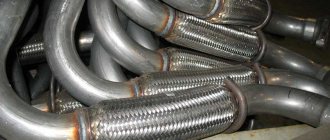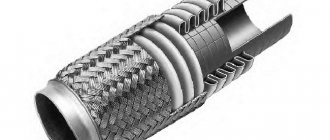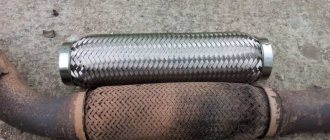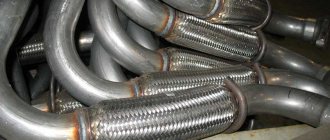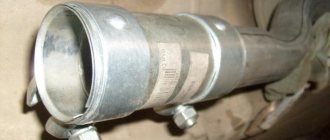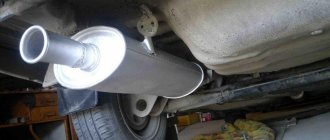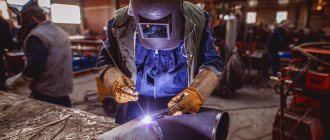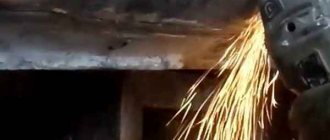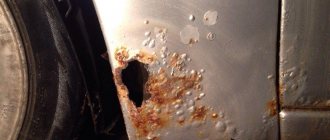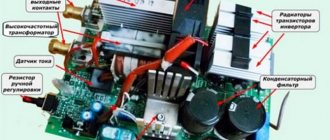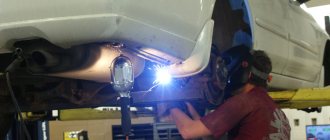Modern exhaust gas systems have certain components and mechanisms that increase the efficiency of their use. The complex design of the device gives rise to questions such as how to replace or repair the muffler corrugation without welding with your own hands.
Do-it-yourself muffler corrugation repair without welding
Repair and replacement of muffler corrugations are part of the basic services that are provided by almost all service stations.
In reality, repairing the muffler corrugation is its replacement, since there is no point in restoring the part. During long-term use, the element burns out, its restoration is ineffective and labor-intensive. Only temporary repairs make sense. Violation of the integrity of the corrugation due to damage is rarely diagnosed; the way to solve the problem is replacement.
Changing a part is easy; a welding installation is desirable, but not required.
Muffler corrugation - what is it?
The corrugation in the muffler is the most important element for removing exhaust gases from the combustion system. It has the form of a corrugated flexible element, alloy steel is used as the base, and a metal mesh is installed on top.
The corrugation in the muffler is the most important element for removing exhaust gases from the combustion system
Many have noticed that when the engine starts, a rattling sound appears from the power plant, which transmits vibration to the muffler. Such influences can seriously compromise the integrity of the gas removal system. The muffler is less susceptible to wear; if you install a corrugation, it dampens vibration shocks and protects the muffler.
On most modern cars, a corrugation is installed; it acts as an elastic connection between the power plant and the gas exhaust system.
Repairing the muffler and replacing the corrugation is most often carried out when elements fail or during regular maintenance, if the percentage of wear does not allow the car to be used until the next inspection. Sometimes they install a “glushak” on their car for tuning.
Why do you need corrugation?
The unit is an auxiliary part of the car, acting as an elastic connecting link.
Without it, the comfort of transport will suffer greatly, as it will not be able to meet even the basic conditions of reliability. Installation takes place on the exhaust pipe and the receiving part of the muffler pipe.
There are exceptions; sometimes the first connection is installed immediately after the exhaust manifold, and the second after the catalyst.
The location and function of a part often leads to the need for premature work on the item. Wear occurs due to the suspension hitting large obstacles, the bottom clinging to the ground, or exhaustion of resources (number of heating and cooling cycles). The frequency of replacement depends on the operating conditions and the quality of the braid; it is better to buy with 2-3 layers.
The corrugation is an auxiliary part of the car
Role and functions of corrugation:
- combating vibrations transmitted from the engine to the muffler;
- facilitating longitudinal movements of the power unit in the engine niche;
- protection against premature destruction of exhaust system components.
The cost of replacing a muffler corrugation directly depends on the make of the car and design features. For a four-cylinder engine with in-line pistons, 1 corrugation will be required, and for a V-twin engine with 6 cylinders - 2.
Consequences of corrugation damage
If the corrugation is damaged, gases will begin to leak before they enter the catalyst and resonator, that is, completely unpurified substances will enter the air. Atmospheric pollution increases many times over; if you stay nearby for a long time, you can feel a deterioration in your health.
The bigger problem is the penetration of gases into the car interior; no one would want to drive such a car. The corrugation is located slightly below the engine with an indent towards the center of the car.
There are air intake ducts located near the unit, through which gases will likely enter the cabin. Poisoning is unlikely to occur, but comfort will be significantly reduced.
If the failure occurs on the road, it is recommended to perform a temporary repair of the muffler corrugation at the nearest station, which will require welding.
Corrugation damage
What reasons?
There are few reasons why it is necessary to replace the muffler corrugation without welding: natural wear of the material, the passage of gases or mechanical damage. The following reasons can lead to such conditions:
- catalyst damage. If it becomes clogged, thermoregulation disturbances will occur, and during overheating, increased pressure is created in the corrugation;
- significant wear of the shock absorber pads on the power unit. The fasteners of the muffler itself are not able to provide sufficient movement of the unit;
- deformations due to impacts on the surface;
- incorrect installation of the device;
- the destructive effects of chemicals that are sprinkled on roads in winter;
- use of additives to increase the octane number in gasoline.
Replacing the muffler corrugation with your own hands will be required after preliminary diagnosis of the condition of the unit. Initially, failure is determined by the presence of noise during movement. If the element is completely destroyed, there is a risk of a strong deafening sound. Indirect evidence that the corrugated connection needs to be replaced is the presence of a characteristic odor from gases inside the cabin.
If you have enough driving experience, you can determine the malfunction by a significant decrease in the car’s power. The greatest reduction is observed in modern vehicles. The reason for the drop in performance is a malfunction of the oxygen sensor, which is included in the exhaust system.
In each case, you will need to replace the muffler corrugation with your own hands without welding or with it, this will help prevent further damage.
Do-it-yourself muffler corrugation replacement
Choosing the right corrugation
The muffler corrugation is often replaced and sold at a service station, but you can buy the component at a car dealership. If the owner has the time or desire to carry out repairs on his own, he should initially purchase corrugation.
The part is not unified; it is developed individually for most cars. The differences are the dimensions. Before going for the unit, you will need to clarify the size of the element; it is better to find out experimentally - from the pit.
Before replacement, it is worth restoring the corrugation and doing the work within the next few days.
When taking measurements, it should be taken into account that you will have to cut the corrugation somewhat further than the weld on which it is fixed. New elements are sold with a slightly reduced diameter for stronger fixation and easier scalding. The corrugation is inserted 3 cm into the pipe, this facilitates repeated replacement of the element on the car without structural changes.
After measuring the length, the diameter is measured. Accurate numbers can only be obtained with a caliper. With known parameters, go to the store or market.
Spare part price
The cost directly depends on the size, model of the car and corrugation parameters. For many low-price cars, the price will be 200–400 rubles.
The cost of a unit for more expensive cars reaches 1200, and sometimes exceeds 1500 rubles. During the purchasing process, you should buy 2 gaskets; they are useful for connecting the flange parts to the corrugation.
When dismantling the old structure, it is impossible to maintain sufficient quality of the old gaskets; it is better to replace them.
Muffler corrugations
Replacing corrugations with your own hands
Previously, corrugation was a hard-to-find element that was sold separately only for foreign cars; today the market offers spare parts for all types of cars and manufacturers. More often, installation is carried out by specialists using a professional welding machine and other tools. The difficulty lies in the need to determine and select the temperature regime.
If the hand is “stuffed” and the person knows how to work with a power tool, the replacement is carried out in several stages:
- Dismantling. Using a grinder, the worn corrugation is cut off.
- Installation. Installation of a new part.
- Cleaning seams.
Incorrect installation will only temporarily help get rid of problems; the service life of the corrugation will be significantly reduced. It is preferable to leave the operation to specialists, but the task can also be done manually.
Preparation
There are a number of recommendations for quality preparation:
- The work will be somewhat easier if you completely dismantle the muffler pipe with corrugation;
- “grinder” cut off the knot at the weld or near it;
- Trying on the part will help identify possible difficulties in installation and determine that the part really fits. A preliminary assessment will prevent distortions in the structure and protect the spare part from excessive load and premature failure. There is no need to install a corrugated connection at the fitting stage;
- After selecting the location, the parts are grabbed at several points to the inlet pipe. Now the whole pipe is removed.
Replacing corrugations with your own hands
Welding
If there is a semi-automatic welding device, there is no need for a service station at all. When there is no equipment, an inverter type is suitable; 1.6–2 mm electrodes are installed in it.
Basic advice from professionals on stages:
- Before work is carried out, the pipe, especially the seam area, is thoroughly cleaned.
- Welding is carried out with a minimum current. The value is selected taking into account the electrode. During operation, the slag is removed.
- Once completed, the welded areas are treated with a protective coating or sealant to prevent corrosion.
The manufacturer does not provide for the use of a standard welding device during the procedure, and given the thinness of the sheet, there is a high risk of burning through the metal. It is recommended to practice in advance on a metal sheet of this thickness.
Often a tin can is used as a test; it makes it easy to determine the tightness of the created seam. If the test result is positive, you should start working.
Otherwise, it is better to continue training until a high-quality seam is created.
Replacing corrugations using welding
Despite the complexity of working with an inverter device, the task is feasible, but it will require skills. At the end of the work, the pipe is put back in place, and the flanges are changed during the installation process.
No welding
An attractive option for owners is to repair the muffler corrugation with your own hands without welding. It is not always an appropriate installation option, but sometimes it is recommended to eliminate welding. An effective and reliable method without the use of welding has become widespread among the people - the method of creating threads.
The process is carried out in steps:
- The cut is made using a grinder.
- A new corrugation is installed in place of the old unit.
- In the place of the rings and pipes, holes with a diameter of up to 6 mm are drilled. The number of bolts is 6–8 pieces for a standard car, depending on the diameter of the pipe.
- Using a tap, apply the thread.
- All collapsible parts are covered with sealant: bolts and joints between the corrugation and the pipe.
- Install corrugation.
The connection is quite reliable and completely sealed.
Temporary repairs
There is an old method to temporarily repair corrugation using a bandage. To defer for 1 month, you will need a thick elastic bandage. The work is carried out from the pit, since it will be necessary to heat the epoxy resin and treat the element with it. The damaged area is covered with a bandage, and resin is poured over the bandage.
This procedure will last for 1 month or less, then even greater damage will appear. It is preferable to replace the corrugation within a few days or weeks.
Conclusion
A malfunction of the corrugated connection impairs the comfort of movement and sometimes provokes destruction. Repairing the corrugation is impractical; it is better to replace the part, since it will be more expensive to repair, and this will only help temporarily. When changing the unit yourself, you should be especially careful during welding, otherwise there should be no problems.
Replacing a car exhaust pipe section
For a more complex type of repair, such as installing a pipe extension to replace a rusted or broken piece of pipe, you will need to make some preparations:
- Park your car in a well-ventilated area.
- Raise the vehicle and place it on jacks or ramps. Set the emergency brakes and block the wheels on the ground to prevent the vehicle from moving.
- Block the front or rear wheels with wooden blocks to prevent the vehicle from rolling while you work underneath it.
- Now put on your safety glasses and crawl under the car.
- If you need to remove any screws from the exhaust system, you may need to apply a penetrating fluid such as WD-40 to the bolts to make them easier to turn; Use only hex sockets or wrenches to prevent rounding of bolts.
- Cut off the piece of exhaust pipe that needs to be replaced. Choose the best tool for the job. Cut the pipe with a hacksaw, grinder or special cutter. Sure, you can make your job easier with a power saw, but you'll produce a lot of sparks and it may not be as safe as using a hand tool, especially when working near a fuel tank.
- You will likely need to install an extension pipe to reconnect the two ends. Select one of the appropriate sizes from your auto parts store.
- Use a spreader to spread one end of the pipe you want to join so that it is round and even.
- Measure how much expansion pipe you need to connect to the other end. Take into account the overlap of the expansion pipe at the end of the other pipe.
- Raise one end so that it is at the same height as the other end you want to join.
- Use a jack to lift and hold it in place if necessary.
- Cut the extension tube to the required size.
- Use an expander to widen it so that it slides over the other part of the exhaust pipe.
- Secure the extension at both ends to the old pipes using exhaust clamps. Do not overtighten the clamp bolts or you will end up with an exhaust leak and additional repair work.
You can also use pre-made pipe adapters if you find the right diameter. Watch the following video to see how they can be installed.
Learning how to repair an exhaust or muffler is not as difficult as you think. A thorough visual inspection of the damaged area and a visit to your auto parts store to check available solutions will help you complete this repair job at home in most cases. This relatively simple fix can eliminate exhaust leaks, pollution and noise. So, taking care of the problem early not only saves you money on car repairs, but also prevents toxic gases from reaching you and anyone riding with you.
How to replace a muffler corrugation without welding?
Corrugation (bellows, vibration compensator, vibration damper) is installed on almost all modern cars. Its main function is to prevent vibration of the car exhaust system. The part also helps prevent the car from overheating.
It connects the intake manifold to the muffler pipes. It looks like a tube made of multilayer metal mesh. Replacing the muffler corrugation with your own hands without welding is possible in all cases where the brand of the car being repaired allows it.
The part takes on the main vibration loads and therefore often becomes unusable. But the use of this spare part in the design of the car exhaust system helps other parts to operate longer.
Also, replacing a muffler corrugation is much cheaper than repairing an entire section of the car. Many people are interested in how to replace it themselves, without using welding.
After all, this part quite often burns out, and there may not be a welding machine in the garage.
Causes of damage
The corrugation can break through from external mechanical influence. The cause of the malfunction may be impacts on hard objects protruding relative to the roadway - stones, bumps, etc. It also becomes less durable due to natural wear and tear.
Another possible cause of damage is the unsatisfactory technical condition of the transmission. Damage to the engine mount and wear of the rubber in the muffler fasteners have a negative impact on the condition of the part.
Also, the spare part can quickly become unusable due to improper installation or dismantling of the muffler.
Chemical reagents used to clear roads of snow in winter have a destructive effect on metal parts. A clogged catalyst can also damage the spare part. The integrity of the part may be compromised by the presence of additives that increase the octane number in the fuel consumed by the vehicle.
Signs of damage
In addition to the loud roar, the car also gives other malfunction signals:
- car “sneezing”, popping noises;
- engine power decreases;
- the rhythm of the engine becomes unstable;
- exhaust gases penetrate into the car interior;
- soot appears on metal parts.
There are three options for replacing the muffler corrugation without welding. The first two methods involve high-quality repairs with further long-term operation of the part. The third is a temporary replacement in order to get to the nearest service station. We will see that welding mufflers and corrugations, although desirable, is not at all necessary.
The first method is corrugation on clamps
In order to repair the corrugation, it can be installed on metal clamps.
Suitable parts for 48 mm Lada cars.
To replace you need to do the following:
- Jack up the car from the rear right;
- Remove the engine crankcase protection;
- Remove the exhaust manifold;
- Saw off the old part with a grinder;
- On the new corrugation, make short longitudinal cuts along the pipes welded to it, this will ensure a tight fit of the part to the exhaust pipe;
- We seal the corrugation and crimp its edges with clamps;
- We install the part in its original place.
After such repairs, the corrugation will not need repairs for a year or a year and a half.
Threaded connection
The old spare part is still cut off with a grinder. In order to install a new part, you must do the following:
- On the rings and exhaust pipe, drill eight holes with a diameter of 4-6 mm around the circumference at the points of contact;
- Using an M5 tap, cut threads in the drilled holes;
- Treat all structural parts with sealant;
- Screw the bolts into the holes;
- Install corrugation.
The use of high-temperature sealant will ensure the reliability of the connection. After completing these steps, you will receive a fairly high-quality and sealed car exhaust system assembly.
Temporary replacement of muffler corrugation
To temporarily replace the corrugation, you will need a regular bandage.
Before starting work, the bandage must be treated with epoxy. The resulting material must be wrapped around the damaged part. Such repairs will last no more than a month.
Some craftsmen decide to seal the area of corrugation deformation with high-temperature sealant. But such repairs will be enough for a maximum of two days of car operation.
Important nuances
As we have seen, welding the muffler and corrugation for repair is not at all necessary. But there are some nuances in the above types of repairs.
The corrugation must be installed evenly, without distortions. At the end of the work, make sure that all brackets and hangers for attaching the muffler are intact and ensure its stability and immobility.
All three options for replacing corrugations will take no more than an hour. The part must be repaired at the first sign of a malfunction. Do not forget that timely replacement of the part is necessary for the further safe operation of the car.
Sealing gaskets
Quite often they become unusable; replacing them is not very difficult; they are located at the junctions of individual parts of the system. However, the inconvenience is that you will have to remove the exhaust system completely. In some cases, you can get by with removing a small area.
Repairing exhaust pipes in this case will not require welding or the use of other complex tools. The hardest part is unscrewing the muffler. Often it is impossible to do without WD-40 due to the sticking of many parts. After removing the old gaskets, you will need to clean the joints and install new ones, and if there are small sinks in the places where they are installed, they can be filled with heat-resistant sealant.
How to replace the muffler corrugation yourself (without welding)
It is very difficult not to notice the breakdown of elements of the exhaust system of a car. Depressurization leads to increased noise and the release of gases in the engine compartment or under the bottom of the car. The same “symptoms” are observed when the vibration compensator of the muffler breaks down.
Replacing the muffler corrugation with your own hands without welding is only possible if you have an original spare part.
If a car has been out of production for quite a long time or is a very rare “overseas” example, then it will be very difficult to find new spare parts for it.
Therefore, in many cases it is necessary to repair a damaged part by patching holes or selecting a similar spare part from another car.
But, even if there is a wavy fold of suitable size, for one reason or another it may be impossible to install it in the traditional way. Fortunately, craftsmen found a way out of this situation. Alternative installation methods will be discussed in detail in this article.
But first you need to find out the main reasons why this malfunction can occur.
Causes of muffler corrugation malfunction
This element serves to compensate for the vibration load on the exhaust system, so the corrugation may fail due to harsh operating conditions.
Irregularities in the road or large objects on the roadway can lead to physical destruction of the element. Premature failure of this part can also be caused by improperly installed muffler, worn engine mounts and a faulty transmission.
If the wavy fold of the muffler is damaged, then in addition to increased noise, there may be a smell of exhaust gases in the cabin. In this case, you can get severe poisoning, so at the first sign of a malfunction of this part, you must begin repairs.
An easy way to repair
Do-it-yourself muffler corrugation repair without welding can be done as follows:
- An ordinary medical bandage is impregnated with epoxy resin.
- The dampened bandage is wrapped around the vibration compensator of the muffler.
- After the resin has hardened, the car can be operated as usual.
This method is the simplest, but the problem of muffler malfunction can be solved using epoxy resin for no more than 1 - 2 months. Over time, the repaired area will burn out and will need to be restored again.
Repair with high temperature sealant
A special muffler repair sealant can also be used to repair a broken corrugated pipe in a car's exhaust system.
Repairs are carried out in the following order:
- The sealant is applied to the outer surface of the element.
- The part is wrapped several times with thin sheet metal, the width of which should be equal to the length of the corrugation.
- The tin is fixed using ordinary screw clamps at the edges and in the middle.
- After 24 hours, when the sealant has hardened, the car can be used as usual.
This method is also temporary and is designed to operate the car for no more than 1 month.
Reliable replacement method (no welding)
The listed temporary methods for eliminating the malfunction of the wavy fold of the muffler do not allow you to forget about the problem for a long time. Therefore, they can be used in extreme cases when it is not possible to carry out a full repair of the muffler exhaust system.
The most correct and reliable way to install a new spare part is welding with the exhaust pipe. But when it is not possible to use a welding machine, you can use an equally effective method of attaching corrugations.
This part can be installed on threaded connections.
Drill holes
The work is performed in the following sequence:
- The old corrugation is cut off with a grinder or a hacksaw immediately behind the weld.
- Next you need to install a new vibration compensator.
- Make a number of holes with a diameter of 4.2 mm, which should be evenly distributed around the circumference. Holes must be made on both sides of the cut exhaust system.
- Using an M5 tap, threads are cut into the holes that were made in the exhaust system.
- M5 bolts are screwed into the holes, which must be installed on engraving washers to prevent unscrewing.
Cut the thread with a tap
In this way, it is possible to obtain a reliable connection of the element with the exhaust system of the car. To increase the efficiency of the connection, you can install the defective assembly and bolts with high-temperature sealant.
Result
Another effective installation method
This simple method of installing a vibration compensator without welding, if done correctly, allows you to fix the problem yourself. Installation is carried out in the following sequence:
- The old corrugation is cut off.
- The new one is sawed longitudinally at the points of connection to the exhaust system and installed on the exhaust pipe.
- Using clamps, the wavy fold is crimped in the places where the cuts were made.
For better sealing, such a connection must also be supplemented with a thin layer of high-temperature sealant, and the clamps must be tightened well and, if possible, the threads must be sealed using any available method.
The durability of this fastening option is no different from standard welding. But with a strong impact in the longitudinal direction, the corrugation can be relatively easily separated from the exhaust system of the car. Therefore, the operation of a machine with low ground clearance should be carried out with extreme caution.
:
The subtleties of repairing a car silencer: is it possible to cover up or seal the hole?
If it is not possible to order sandblasting of the muffler and pipes, the places where gases escape are cleaned with coarse sandpaper or a metal brush with a margin of area.
We recommend checking problem areas with active rusting.
The repair area is degreased with a solvent.
Repairing small cracks and holes:
- Longitudinal cracks are drilled along the edges with a Ø 3 drill to relieve internal stress in the metal.
- Mixing of the composition is carried out immediately before sealing.
- Damage up to Ø10 should be covered with a layer of 5–7 mm, supported by 8 mm of whole metal around the perimeter.
- Leave for 4 hours, gradually warm up the unit to operating temperature.
- Bubbling of the adhesive layer indicates a violation of the surface preparation technology. Requires repeated cleaning, degreasing, drying and gluing.
- It is recommended to screw a self-tapping screw into the small holes of the outlet manifold through the cold welding layer.
- The patches of the units under pressure are fixed with clamps to ensure mechanical strength.
Muffler corrugation repair
Vehicle malfunctions must be identified, prevented, and eliminated in a timely manner. Many car enthusiasts prefer to maintain and repair their car with their own hands. Let's figure out how you can repair the muffler corrugation in your own garage without using welding.
Device
The exhaust gas removal system consists of the following components:
- Intake manifold. Connects several outputs into one. Hot gases fly into it from the combustion chamber. Having slightly reduced the temperature, they burst into the neutralizer (initial catalyst).
- Neutralizer. The speed of gases is suppressed, the temperature decreases. Passing through plate filters, they are cleaned of harmful toxic substances.
- Corrugation. Connects the intake manifold to the muffler pipes, while compensating for mechanical movements.
- Second catalyst. Pipe with many sections. Here the gases are further purified in accordance with international standards.
- Resonator. The first muffler, where holes, partitions, slits, and grilles are arranged. Gases, passing through obstacles, lose strength and speed, and sound waves die down. In expensive cars, the resonators are tuned like an organ, creating a pleasant sound.
- Muffler, exhaust pipe. They dampen final noise, reduce temperature with their porous structure, the presence of fillers and partitions.
Functions
A car with a working, sealed exhaust system operates quietly, the sound of a running engine is almost inaudible. The main purpose of the system is to remove waste gas material formed after fuel combustion into the atmosphere.
An important role is played by:
- reduction of noise resulting from engine operation and gas removal;
- neutralization of their toxicity;
- creating the necessary pressure for the engine.
The greatest damage to the exhaust system is caused by external influences. Corrosion rapidly, day after day, eats away metal, turning it into dust.
City utilities use deicing agents and saline solutions.
These substances, when mixed with sand and small crushed stone, significantly accelerate the process of introducing rust into the exhaust system, located in the most vulnerable place under the bottom of the car.
The condition is complicated by temperature changes in the off-season; the welds of the flanges near the muffler, exhaust pipe, and corrugated area are especially affected. Condensation, which accumulates inside the resonator, muffler, adds to the destruction from the inside, “aggressive” chemical compounds present in the exhaust gases finally finish off the entire structure.
Symptoms of a problem
Mechanical damage significantly accelerates the process of failure of elements.
Sharp stones, periodic contact with pipes, corrugated planes, and the muffler tank on road irregularities create cracks, scratches, and tears in the metal layer and protective coating.
Slowly but surely small holes appear in the exhaust system elements, which, as they increase in size, cause discomfort.
The car starts to sound different. At first, small rattling sounds and dull pops gradually appear. Then metallic notes and loud exhausts become audible. And finally, when you press the accelerator pedal sharply, a loud roar arises that can be heard a kilometer away. This is how sports cars roar at international races.
Signs of malfunction are becoming more and more apparent. Here are the most notable of them:
- loud roar, sneezing, clapping;
- reduced engine power, weak traction, acceleration during acceleration;
- unstable rhythm of engine operation, jumps in idle speed;
- filling the cabin with exhaust gases;
- soot on metal parts.
You can identify burnt holes while the car is running on an overpass or in a hole in the garage. Clouds of hot exhaust gas and smoke burst out of them. Many car enthusiasts turn to a welder they know to weld the affected area or apply a metal patch with their own hands. After this, the car can be driven for another couple of months.
All the same, a major overhaul with replacement of the corrugation mesh and muffler internals is inevitable. There is no point in delaying repairs, because a neglected exhaust system will cost the car owner much more. It’s easier and cheaper to immediately identify defective areas and repair them with available materials yourself.
Do-it-yourself repairs
Burnt-out components: corrugation, muffler, catalyst - are most often restored, dismantled, or replaced by welding.
In parallel with this, there are two options for repairing the exhaust system with your own hands without the use of welding.
The first method is intended for permanent installation of a corrugation instead of a damaged one, the second is a temporary replacement in emergency mode, followed by permanent repairs.
A new corrugation costs 700 rubles; to weld it, they charge 2,500 rubles. The total is 3200 rubles. Instead of welding work, you can repair the exhaust system using clamps.
You need to buy two Zhiguli clamps measuring 48 mm, a corrugation with a cross-section of 45 mm, and a length of 200 mm. The entire purchase costs 1000 rubles. The original corrugation may be different - 100–200 mm, but this is not a hindrance.
Tools: grinder, cutting wheel for metal.
The right side of the car is jacked up, the protection is removed, and the exhaust pipe studs are unscrewed from the manifold. A long clamp is released from below and the muffler is removed.
Worn corrugation must be cut off with a grinder. On the new one, cuts are made along welded universal pipes. This is done to better tighten the clamps. The corrugation is attached on both sides and covered with clamps.
Assembly is carried out in reverse order.
If the corrugation burns out and the owner cannot get out to the workshop, there is a temporary DIY option without welding. A new corrugation and elastic medical bandage are purchased.
In a pit or overpass, it is tightly wrapped with a bandage well impregnated with epoxy resin. The minimum operation after such repairs is one month, the maximum is three.
However, you should not delay it, as the remaining elements of the exhaust system will begin to rapidly deteriorate.
In conclusion, advice from experienced
To avoid costly repairs, every car owner must carefully inspect the entire bottom and exhaust gas system twice a year in a pit or overpass. This will allow you to identify small scratches, cracks, and pockets of corrosion as early as possible.
At the initial stage, they can be cleaned and puttied, thereby preventing further spread. With this attitude, your car will always drive with a pleasant whisper, bringing pleasure to the owner.
Why does a car need an exhaust system?
The essence of the processes taking place inside a car engine is an “explosion”. Any explosion is accompanied by effects - a sound wave and the removal of combustion products. The exhaust system of a car serves to minimize such phenomena in engine operation and solves the following problems:
- removal of combustion products from the engine
- reduction of engine noise
- reducing the level of toxic substances emitted in exhaust gases
- removal of fuel combustion products outside the vehicle
Do-it-yourself muffler corrugation repair without welding
It is very difficult not to notice the breakdown of elements of the exhaust system of a car. Depressurization leads to increased noise and the release of gases in the engine compartment or under the bottom of the car. The same “symptoms” are observed when the vibration compensator of the muffler breaks down.
Replacing the muffler corrugation with your own hands without welding is only possible if you have an original spare part.
If a car has been out of production for quite a long time or is a very rare “overseas” example, then it will be very difficult to find new spare parts for it.
Therefore, in many cases it is necessary to repair a damaged part by patching holes or selecting a similar spare part from another car.
But, even if there is a wavy fold of suitable size, for one reason or another it may be impossible to install it in the traditional way. Fortunately, craftsmen found a way out of this situation. Alternative installation methods will be discussed in detail in this article.
But first you need to find out the main reasons why this malfunction can occur.
Exhaust system design
Exhaust system design
The exhaust system consists of the following elements:
The exhaust system is designed to remove exhaust gases from the engine cylinders.
- An exhaust manifold;
- Oxygen sensors;
- Catalytic converter ( muffler catalyst ) or particulate filter;
- Exhaust pipeline;
- Pipe with vibration-isolating coupling (corrugation);
- Resonator or pre-muffler;
- Main muffler;
- Muffler suspension.
Almost all elements, except the exhaust manifold and sensors, are made of stainless steel. Vehicle operating experience shows that even such steel can rot under the influence of chemicals and temperature changes. Weld seam areas are also susceptible to corrosion, because during the welding process under the influence of high temperature, the parts being welded are connected to each other with a fusible electrode, which does not carry protective properties, the temperature of the stainless steel changes and passes into a different state of aggregation: austenite or ferrite, which is allowed It is easy for it to oxidize in air and rust. Impact loads that appear from road unevenness have a negative effect. Often mechanical damage appears on the muffler and resonator, which reduces the flow area, and this slows down the rate of exhaust gas removal, i.e. the cylinders are poorly cleaned, and this leads to loss of engine power, decreased efficiency and increased fuel consumption. Often you can find a simply burnt out muffler. This occurs when the fuel mixture does not completely burn in the engine cylinder, but burns out in the exhaust system. All exhaust system malfunctions can be quickly eliminated on your own.
How to replace or repair a muffler corrugation without welding?
A corrugation (vibration damper, vibration compensator or bellows) is installed on cars to prevent vibration of the exhaust system and overheating of the car. Given the loads taken, the part often fails. Repair is cheaper than replacement. Welding is required as standard, but if you don’t have it at hand, you can do it in other ways.
Causes and symptoms of muffler corrugation malfunction
Corrugation damage is often associated with mechanical stress. This may include impacts from bumps and rocks, as well as wear and tear over time.
Other causes of damage include poor condition of the transmission, worn rubber in the muffler mounts, and improper installation.
Reagents used on roads by public utilities destroy metal. Additives in automobile fuel also work.
The main sign of a bellows malfunction is an unusual sound when starting the engine and when driving. In addition, the following signs indicate a malfunction:
- reduction in engine power;
- car popping and sneezing;
- instability of the rhythm of the running motor;
- penetration of exhaust into the cabin;
- the appearance of soot on metal components.
If the above symptoms are detected, it is necessary to replace the corrugation. There are several methods, the choice of which determines the life of the machine.
Methods for repairing and replacing corrugations
Service station employees are skeptical about the car owner’s decision to replace the vibration damper on his own without welding. Despite this, the connection can be quite reliable if you select the correct corrugation and consistently carry out a series of measures. No specific tools are required. Everything you need is usually in the garage.
Replacing corrugations using clamps
To use this method, you need to select a new corrugation, the length of which is 5 cm greater than the distance between the seams remaining from the broken part. The internal diameter in the corrugated pipes should be 1 mm larger than the diameter of the pipes in the exhaust system. Sequencing:
- Place the machine above the inspection hole.
- Remove the area with the damaged vibration damper.
- Using a grinder, cut off the broken corrugation and remove burrs.
- Make a couple of cuts at the ends of the pipes so that they fit snugly against the pipes. Apply sealant over shallow cuts.
- Put on the corrugation, fix (but do not tighten) the clamps to correct the position.
- Install the part in place, not forgetting to replace the gaskets.
- Tighten the clamps. To prevent the nuts from loosening, tap the threads.
Experienced car owners claim that the corrugation holds on clamps no worse than when welded. But there is one drawback - a longitudinal impact can cause the part to jump off the pipe. Therefore, if the car is low-slung, you will have to drive more carefully.
Epoxy resin
The use of epoxy resin in the event of a vibration compensator failure is considered a temporary measure. If you urgently need to restore the functionality of your car, but don’t have time to go to a car service center for repairs, you can resort to a simple method of repairing the corrugation.
You will need a medical bandage, it is better to take an elastic one. The fabric is impregnated with epoxy resin and then wound onto corrugation. After the composition has hardened, you can use the machine as usual. This method will help for no more than a month.
Instead of a bandage, you can use heat-resistant tape or fiberglass.
Troubleshooting
Having knowledge and some dexterity, following a certain sequence, you can quickly repair the gas exhaust system yourself, dividing all the work into certain stages:
First, on an inspection pit or overpass, carry out a visual inspection of the entire gas exhaust system to identify a malfunction.
Then carry out dismantling work. But before dismantling, it is recommended to treat all threaded connections with a penetrating liquid, many of which are almost always on hand - these are:
- Brake fluid.
- Antifreeze.
- Petrol.
- Kerosene.
- Diesel fuel.
After dismantling the muffler, repair it and install it in place. Its repair and other parts of the gas exhaust system can be carried out using one of the options described below.
Prevention measures
The need to repair a muffler may not arise immediately. Usually, some prerequisites appear first, which can be prevented by proper prevention, the use of high-quality fuel and a balanced driving regimen.
The muffler must be mounted only on standard suspensions. If the suspensions are made in-house, they must meet certain standards specified for the given vehicle and muffler.
For preventive maintenance, some car enthusiasts fill the muffler with an anti-corrosion liquid, which pushes away moisture and prevents internal corrosion.
